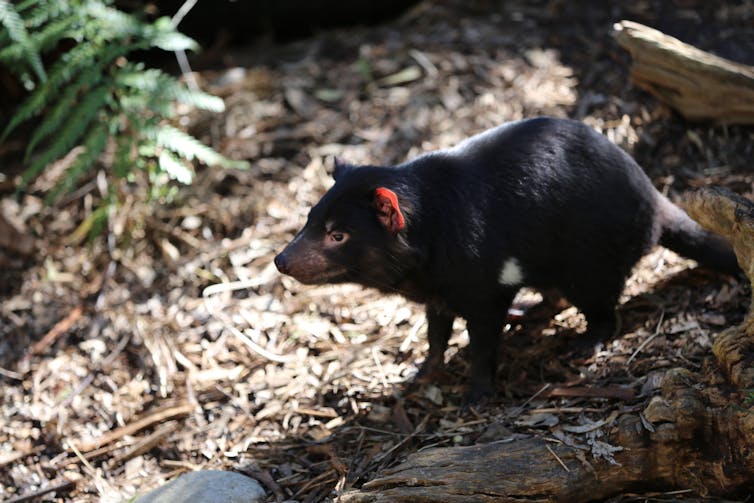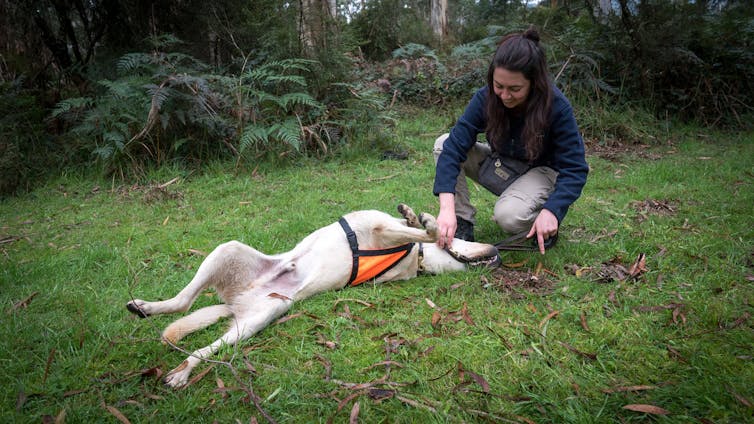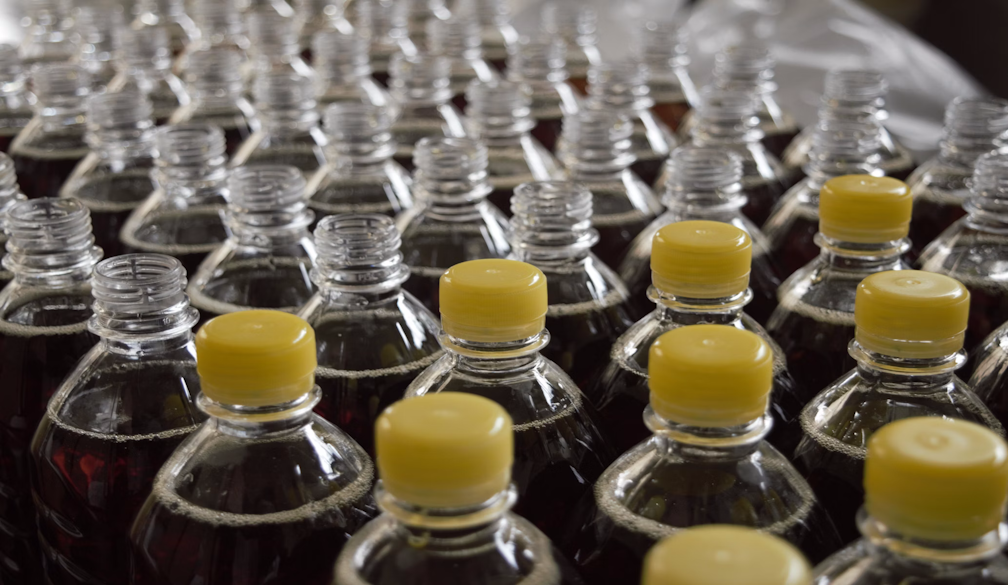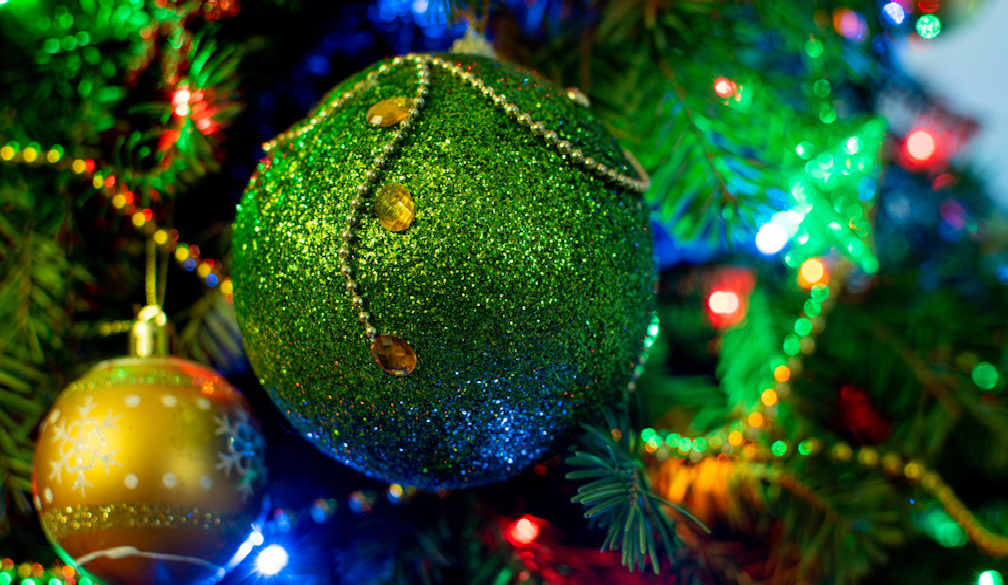Meet Moss, the detection dog helping Tassie devils find love
- Written by La Toya Jamieson, Wildlife Detection Dog Specialist, La Trobe University
Moss bounds happily through the bush showing the usual exuberance of a young labrador. Despite this looking like play, he is on a serious mission to help fight the extinction of some of our most critically endangered species.
Moss is a detection dog in training. Unlike other detection dogs, who might sniff out drugs or explosives, he’ll be finding some of Victoria’s smallest, best camouflaged and most elusive animals.
Read more: Sit! Seek! Fly! Scientists train dogs to sniff out endangered insects
These dogs use their exceptional olfactory senses to locate everything from koalas high in the trees, desert tortoises burrowed deep under soil and even whales — often more effectively than any human team could aspire to.
What makes Moss unique, however, is he’ll not only find endangered species in the wild, but will also be part of a larger team helping endangered species breed in captivity. These dogs will be the first in the world to do this, starting with a ground-breaking trial with Tasmanian devils.
Moss will eventually help find the tiny, cryptic Baw Baw Frog in the wild.Why Moss needed a job
Wildlife detection dogs are a very rare type of dog — they are highly motivated, engaged and energetic, but also incredibly reliable and safe around the smallest of creatures.
And Moss is the first dog to join Zoos Victoria’s Detection Dog squad, a permanent group of highly trained dogs that will live at Healesville Sanctuary.
Read more: Is your dog happy? Ten common misconceptions about dog behaviour
Moss was adopted at 14 months old, after he somewhat “failed” at being a family pet. He is a hurricane of energy with an intelligent and playful mind. He’s thriving with a job to keep him occupied and new challenges for his busy brain.
One sign he was perfect for this program was his indifference to the free range chickens at his foster home. For obvious reasons, a dog who likes chasing chickens wouldn’t be a good candidate for protecting some of Australia’s rarest feathered treasures.
Moss will also help monitor incredibly well camouflaged plains-wanderers, which are nearly impossible to spot in the day.Currently Moss is learning crucial foundational skills, and getting plenty of exposure to different environments. Equally important, he is developing a deep bond and trust with his handlers.
The detection dog-handler bond is crucial not only for his happiness, but also for working success and longevity. Research from 2018 found a strong bond between a handler and their dog dramatically improved the dog’s detection results and reduced signs of stress.
The Tasmanian devil’s advocate
Healesville Sanctuary breeds endangered Tasmanian Devils every year as part of an insurance program to support conservation and research. This program is crucial to help protect the devil following an estimated 80% decline in the wild due to a horrific transmissible cancer, Devil Facial Tumour Disease.
Read more: We developed tools to study cancer in Tasmanian devils. They could help fight disease in humans
But managing a predator that’s shy, nocturnal and prefers to be left alone can be tricky.
Wildlife, including Tasmanian devils, need a hands-off approach where possible, so they can maintain natural behaviours and thrive in their environment.
 Tasmanian devils prefer to be left alone.
Healesville Sanctuary, Author provided
Tasmanian devils prefer to be left alone.
Healesville Sanctuary, Author provided
In the wild, devils leave scats (faeces) at communal latrine sites and use scent for communication. Male devils can tell a female is ready to mate by smelling her scat. And we think dogs could be trained to detect this, too.
We aim to train dogs to detect an odour profile in the collected scat of female devils coming into their receptive (oestrus) periods, so we can introduce females and suitable males to breed at the optimal time. The odour profile will be further verified via laboratory analyses of hormones in the scats.
Read more: Koala-detecting dogs sniff out flaws in Australia's threatened species protection
The project will also explore whether dogs can detect pregnancy and lactation in the devils.
Currently, the best way to determine if a female has young is to look in her pouch, but our preference is to remain at a distance during this important time while females settle into being new mums.
 Moss with his trainer, Latoya. Moss is a ball of energy and thrives in the challenging environment of conservation detection.
Healesville Sanctuary, Author provided
Moss with his trainer, Latoya. Moss is a ball of energy and thrives in the challenging environment of conservation detection.
Healesville Sanctuary, Author provided
If the dogs are able to smell a scat sample (while never coming into contact with the devil) and identify that a female is lactating with small joeys in her pouch, we can support her – for example, by increasing her food – while keeping a comfortable distance.
A new partnership in conservation
The results from this devil breeding research could offer innovative new options for endangered species breeding programs around the world.
Wildlife detection in the field means we can more accurately monitor some of our most critically endangered species, and quickly assess the impact of catastrophic events such as bushfires.
Read more: Curious kids: How far away can dogs smell and hear?
Detection dogs are the perfect intermediary between people and wildlife — they can sniff out what we can’t and communicate with us as a team.
And over the next few years, the Detection Dog Squad will expand to five full-time canines. They will all be selected based on their personalities rather than specific breeds, so will likely come in all shapes and sizes.
Dogs may yet go from being man’s best friend to the devil’s best friend and beyond, all starting with a happy labrador named Moss.
This article is co-authored by Naomi Hodgens, Wildlife Detection Dog Officer at Zoos Victoria, and Dr Kim Miller, Life Sciences Manager, Conservation and Research, at Healesville Sanctuary, Zoos Victoria.
Authors: La Toya Jamieson, Wildlife Detection Dog Specialist, La Trobe University
Read more https://theconversation.com/meet-moss-the-detection-dog-helping-tassie-devils-find-love-142909



















